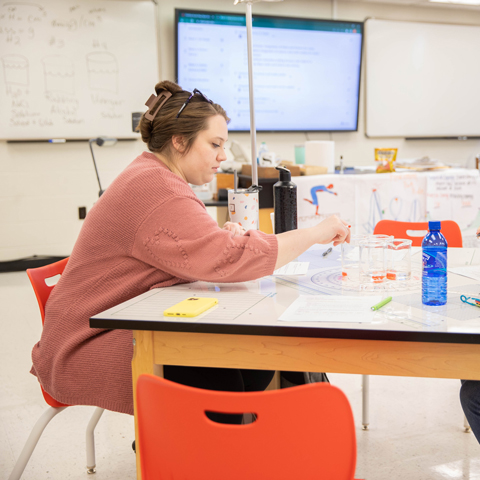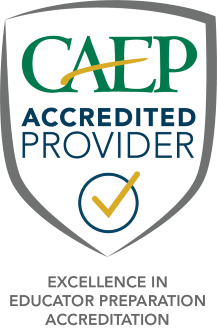Why Study Science Education Research and Practice
The M.A.Ed. in Science Education Research and Practice is well-suited for the highly-motivated
student interested in various roles on research projects and in implementing novel
instructional strategies in classroom and/or non-formal educational settings.
The scientific enterprise, after rigorous testing and peer-review, provides many answers
and solutions but is always characterized by some level of uncertainty and emergent
questions. Likewise, research into the efficacy of STEM instruction and/or socioscientific
educational policies can produce actionable results. As experienced in most cases,
however, more questions for continued research are generated.
The intersection between “what is known” and “what is yet to be learned” marks the
point where one transitions from merely a consumer of information to an active contributor
for collective understandings in society. Arriving at this juncture of self-awareness
is where you know you will be ready for work on an advanced degree in science education.
Given the increasing importance of science fields in all aspects of society and the national shortage of quality science teachers and leaders, a master’s degree focused on science education research and pedagogy you’re your career a meaningful boost. The average salary increases for those obtaining a master’s degree is about 20% above those with a bachelor’s degree only. This increase compounds over the life of your career. The demand for effective teachers of science across all grade levels is expected to increase in the future. Becoming a leader in science education research and practice will position graduates for important roles in cultivating proper skills and scientific mindsets for new generations of teachers. Outside of the traditional educational setting, graduates may contribute to essential policy decisions for increasing scientific literacy among the citizenry.
- Other benefits and possibilities when obtaining a M.A.Ed. in Science Education:
- Improve your science content knowledge with engaging activities
- Become proficient in research-based, best pedagogical practices for inquiry science
- Learn to integrate the disciplines for a richer, more effective student experience
- Develop skills to become a leader in science education at your school
- Create a niche in science education policy at the local, state, and/or national levels
- Springboard into a doctoral program to continue your research and teaching interests
The Science Education Research & Practice degree concentration is taught by faculty who have vast experience as K-12 science classroom teachers, advanced degrees in both the science disciplines and educational strategies, experience in designing and conducting research on issues in science education, and who have been recognized by a variety of outside entities as leaders and innovators in the field. The faculty bring unique levels of expertise and practical insights into the classroom, exposing students to real-world, science-related problems to be explored by candidates in the same way younger students would be facilitated in investigations. The Educational Specialties Department in the Eriksson College of Education at APSU is a cooperative community of educators and researchers who are equipped and willing to serve on committees to guide students through the research and writing process.
Unique professional relationships among College of Education faculty and College of STEM faculty provide students with a wealth of resources and opportunities in both the science disciplines and pedagogical practice. The “Short Collaborative for Research on Science & Socioscientific Education” offers networking opportunities among students across different layers of research interests at APSU as well as other academic institutions. The available range of experiences for both science education practice and research helps students deepen their understanding of the historical trajectory and current challenges in the field. The potential for richer contributions emerges as the connections among scholarly work strengthens.
Admissions Requirements
For information related to admission requirements please visit the graduate bulletin.
What will I learn
Throughout the course of their studies, candidates in the Science Education Research & Practice concentration of the Master of Arts in Education – Curriculum & Instruction degree will be challenged to:
- articulate how students learn and develop knowledge of science and scientific process skills.
- express, in written and oral formats, the knowledge of best practices of modern science instruction.
- develop inquiry- and problem-based lesson plans in appropriate settings, consistent with safety guidelines, that are aligned with state standards and national frameworks for science. Plans will be designed to engage diverse students in activities that address the nature of science, inquiry, and interactions between science and society.
- construct performance-based assessment strategies to equitably measure progress toward achievement of learning targets in the science classroom and use data-driven approaches to modify instruction based on evaluations and student feedback.
- demonstrate proficiencies in conducting and presenting original research on relevant problems in science education.
Program Information
Science Education Research and Practice Program Requirements
Curriculum and Instruction: Science Education Research and Practice, MAED
Professional Licensure Disclosure
Students should be aware that licensure and certification requirements vary from state to state and are subject to change. Licensing agencies or boards also may have requirements in addition to an earned degree. APSU recommends that students who are not Tennessee residents or who plan to seek licensure or certification outside the state of Tennessee contact the appropriate licensing agency or board before they enroll in an academic program designed to lead to licensure or certification and discuss their plans with an advisor.
Please visit the Professional Licensure Disclosure webpage to review specific licensure information for your state and academic program.

